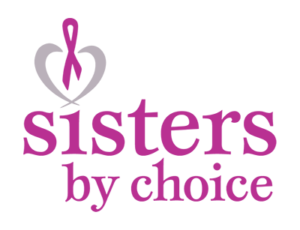Know what is normal for your breasts
Breast Cancer Risk Factors
90% of people who get breast cancer we do not know the cause. However, there are associated risk factors.
Personal Cancer History
- You have blood relatives (grandmothers, mother, sisters, aunts) on either your mother’s or father’s side of the family who had breast cancer diagnosed before age 50.
- There is both breast and ovarian cancer on the same side of the family or in a single individual.
- There are other cancers in your family in addition to breast, such as prostate, melanoma, pancreatic, stomach, uterine, thyroid, colon, and/or sarcoma.
- You are African American and have been diagnosed with breast cancer at age 35 or younger.
- A man in your family has had breast cancer.
- There is a known abnormal breast cancer gene in your family.
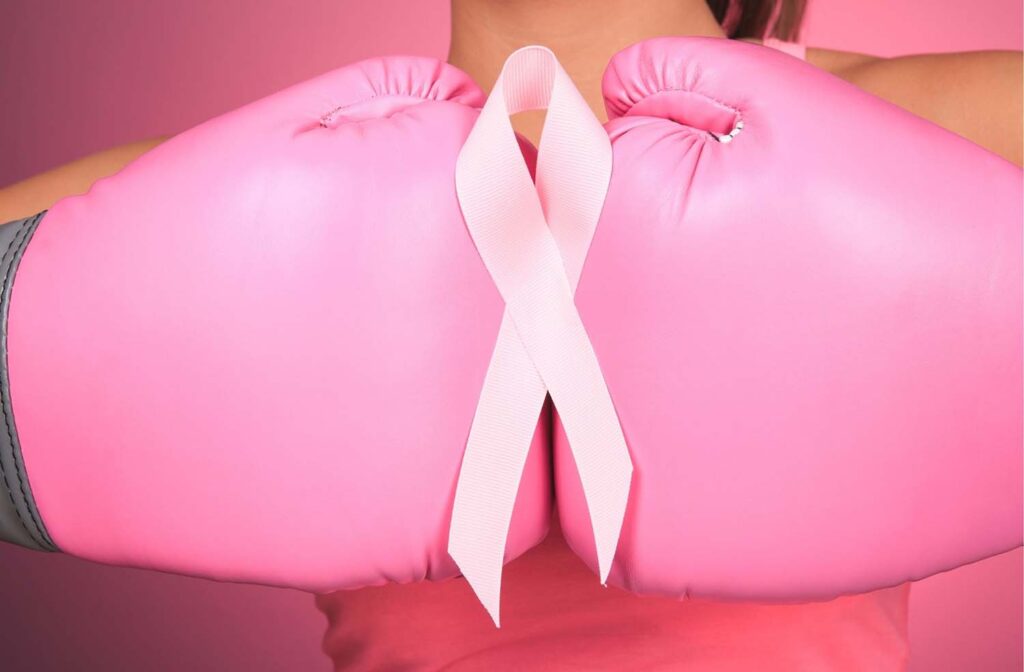

Know Your Family History
It is important to know your family history. You should investigate who has had breast cancer on both your mother’s and father’s side of the family. A family history of any of the following may be a sign of hereditary cancer:
A Relative With:
- Bilateral breast cancer (cancer in both breasts)
- Breast and ovarian cancer
- Male breast cancer
- A BRCA mutation
Two Relatives With:
- Breast cancer (one before age 50)
- Ovarian cancer at any age
- One with breast cancer and one with ovarian cancer
Three Relatives With:
- Breast cancer at any age
Breast Cancer Risk
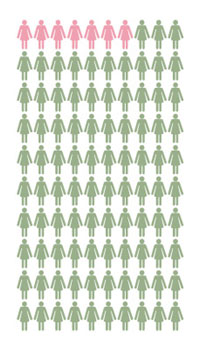
Women In The U.S. General Population

About 7 out of 100 women in the U.S. general population will get breast cancer by the age of 70

About 93 out of 100 of these women will NOT get breast cancer by age 70
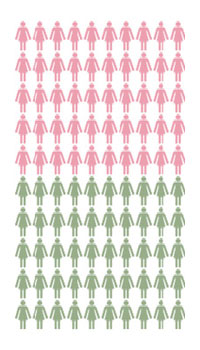
Women with a BRCA1/2 Genetic Change

About 50 out of 100 women with a BRCA1 or BRCA2 genetic change will get breast cancer by the age of 70

About 50 out of 100 of these women will NOT get breast cancer by age 70
Ovarian Cancer Risk
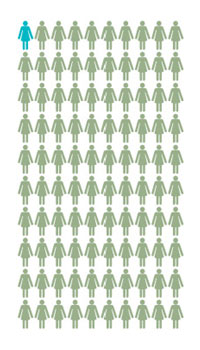
Women In The U.S. General Population

About 1 out of 100 women in the U.S. general population will get ovarian cancer by the age of 70

About 99 out of 100 of these women will NOT get ovarian cancer by age 70
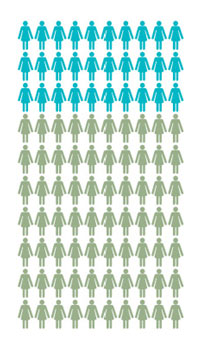
Women with a BRCA1/2 Genetic Change

About 30 out of 100 women with a BRCA1 or BRCA2 genetic change will get ovarian cancer by the age of 70

About 70 out of 100 of these women will NOT get ovarian cancer by age 70
Genetic Testing

Important things to know:
- Most breast and ovarian cancers are not caused by these genetic changes
- Most people don’t need to be tested for the BRCA 1/2 gene
- If there is a strong family history of breast and/or ovarian cancer, meeting with a genetic counselor may be helpful
- Health insurance may not always cover the cost of testing
- Genetic testing is most useful if first performed on someone in the family who has had breast or ovarian cancer
Breast Cancer Myths
Men account for 1% of all breast cancers in the US. Any unexplained lump in a male breast should be evaluated by a healthcare provider.
This is probably the most popular breast cancer myth of all. It has to do with certain underarm products that contain preservatives called parabens. These chemicals can act like the hormone estrogen in the body. Estrogen is known to fuel certain breast cancers. Many breast cancers develop in the part of the breast closest to the armpit, where antiperspirants and other underarm products are used.
Now a new study shows that yes, there is evidence of parabens in 99% of breast tissue samples taken from women with breast cancer, but many of these women did not use any underarm products. Most major brands of deodorants and antiperspirants no longer contain parabens.
While mammography does catch the vast majority of breast cancers, it is only one screening tool. Women should also have a breast exam done by their healthcare provider each year. If you feel a lump, always get it checked out, even if your last mammogram was clear.
A few years ago, a book was published stating that underwire bras may cause breast cancer. This is completely untrue and there are no credible studies to support that wearing an underwire bra can cause breast cancer.
Breast cancer is not a death sentence. We have more tools in our arsenal to combat the disease, and most women who are diagnosed with breast cancer survive.

Breast Cancer Risks
- Increasing Age
- Female
- Genetic Mutations (Brca 1 & Brca 2)
- Family History (One or More Immediate Family Members)
- Personal History of Breast Cancer
- Radiation Treatment to the Chest as a Child
- Age of Menstrual Cycle <12 Years Old
- Menopause > 55 Years Old*
- Post-menopausal Weight Gain
- Being Overweight
- Alcohol Consumption ( >2 Drinks a Day)
- Childbearing after the Age of 35
- Ashkenazi Jewiksh Heritage
- High Levels of Estrogen
- Lobular Carcinoma Insitu
- Lobular Carcinoma Insitu
- Dense Breast Tissue (Not a Risk Factor per Se but Could Delay Diagnosis)
Factors That Do Not Increase Or Decrease Risk Of Breast Cancer
- Hair dyes
- Abortion
- Deodorant
- Breast implants
- Electromagnetic fields
- Aspirin use
- Dairy consumption
- Soy intake
Factors Still Under Study
- Smoking
- Stress
- Trauma to the breast
- Breast size
- Caffeine use
- Cell phone
- Hair relaxer
- Underwire in bras
Personal Cancer History
- You have blood relatives (grandmothers, mother, sisters, aunts) on either your mother’s or father’s side of the family who had breast cancer diagnosed before age 50.
- There is both breast and ovarian cancer on the same side of the family or in a single individual.
- There are other cancers in your family in addition to breast, such as prostate, melanoma, pancreatic, stomach, uterine, thyroid, colon, and/or sarcoma.
- You are African American and have been diagnosed with breast cancer at age 35 or younger.
- A man in your family has had breast cancer.
- There is a known abnormal breast cancer gene in your family.
